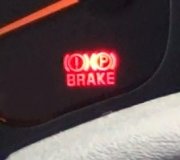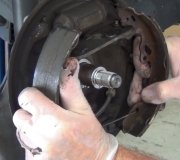There's a number of issues we have to discuss. First of all, when anyone says, "it's just, ... ", They would have fixed it if that's all it was. No one is going to sell a car with an easy-to-fix repair because doing so will increase the car's value. They likely sold the car because they knew exactly what was wrong and it's going to be an expensive repair.
The second concern is there are a real lot of things professionals do during a routine brake service to avoid causing problems, including noises and vibrations, and there's a lot of things inexperienced mechanics can accidentally do to cause problems. One of the most common mistakes is once everything is reassembled, you have to pump the brake pedal a number of times to work the pistons back out of the calipers until the new pads contact the rotors. Most do-it-yourselfers push the brake pedal all the way to the floor. Experienced mechanics will never go past half way to the floor, and they know to warn about the possible need for a new master cylinder when a customer comes in with a ruptured rubber hose or steel line. Crud and corrosion build up in the lower halves of the two bores where the pistons don't normally travel in the master cylinder. Pushing the pedal past half way runs the lip seals over that crud and tears them. This also happens when people think they have to bleed the system with a helper pushing the brake pedal. Very few professionals bleed with a helper. We use gravity-bleeding with no special tools.
The torn lip seals cause a slowly-sinking brake pedal due to the internal leakage inside the master cylinder, but the important clue is you will not be losing brake fluid. That slow sinking often doesn't show up right away. It commonly starts occurring two or three days later. If you're seeing the fluid level go down in the reservoir, you have an external leak somewhere else. You should be able to identify the location by looking for wet spots along the left side of the vehicle and inside next to each wheel. If everything is dry there, unbolt the master cylinder from the power booster and pull it away an inch or two, then look for wetness there. Leakage at the rear seal will let the brake fluid run into the booster, then it will get sucked into the engine and be burned.
The third concern is not of significance here but it bares mentioning anyway. Since you installed new linings on the front disc brakes, it's okay to fill the fluid reservoir. We never add brake fluid during other routine services like oil changes and tune-ups. As the disc brake pads wear, the pistons work their way out of the calipers to take up the space. That's the self-adjusting feature of all disc brakes. Brake fluid from the reservoir fills in behind the pistons. You have to push those pistons back in to make room for the new pads. Doing that pushes all that brake fluid back up into the reservoir. If someone filled the reservoir previously, the excess fluid is going to overflow and make a huge mess. Brake fluid eats paint too.
There's one more tidbit of great value you should be aware of. The Anti-lock Brake Computer is constantly performing a number of tests on the system. Some occur when you turn on the ignition switch and are completed after six seconds when the yellow warning light goes off. Some tests take place when the car is moving. Others take place only when the car is moving and the brakes are applied. The computer looks at a number of things and compares them to each other to identify when there's a problem, then it sets a diagnostic fault code, turns the system off, and turns the yellow warning light on to tell you. When a problem is detected, most of the time any tests that rely on the defective circuit for comparison are suspended. In the case of wheel speed sensors, for example, the computer knows that when one of them is reading 45 mph and the brakes are not applied, the other three had better be reading 45 mph too. If you do indeed have a defective sensor, some of the tests on the other wheel speed sensors may be suspended. If you have that problem fixed soon, that's usually the end of the story, but when people wait months or years, it's likely another two or three problems developed but since some tests were suspended, those new problems didn't get detected and there's no fault codes related to them.
When you finally take the car in to have it repaired, all the mechanic has to go on to give you an estimate is the fault codes stored in the computer. Typically that will be for that first wheel speed sensor, (in my sad story). Once that part is replaced, he is going to erase the code and go for a test drive. That's when the self-tests resume and the next problem is detected. Now the mechanic has to start the diagnosis all over and tell you more parts are needed. We hate having to do that, and you incorrectly assume he misdiagnosed the problem or he's trying to sell you more parts as long as you already have your wallet open. If you think about this from our point of view, this doesn't do anything to positively affect our reputation. We want to fix your car right the first time.
Multiple repeat wheel speed sensor failures are real common on GM front-wheel-drive cars. New ones can develop problems in as little as 15,000 miles. This isn't such a big problem on other car brands but waiting too long can still allow time for more problems to occur. I would suggest having your mechanic read and record the fault code(s) for the ABS system, then if one does point to a wheel speed sensor, have that repaired right away since it's not very serious or expensive. Be aware though that fault codes never say to replace parts or that they're bad. They only indicate the circuit or system that needs further diagnosis, or the unacceptable operating condition. A failed wheel speed sensor is very rare. You're much more likely to find a cut wire or corrosion on the terminals in a connector. The GM problem is due to a tiny amount of normal play developing in the wheel bearing, then the signal from the sensor gets real weak to the point the computer can't read it. The fault code there will be for the speed sensor, but the fix is new wheel bearing. That's what I mean that fault codes only tell you which circuit to look at, not which parts to replace.
Wednesday, May 27th, 2015 AT 8:41 PM



